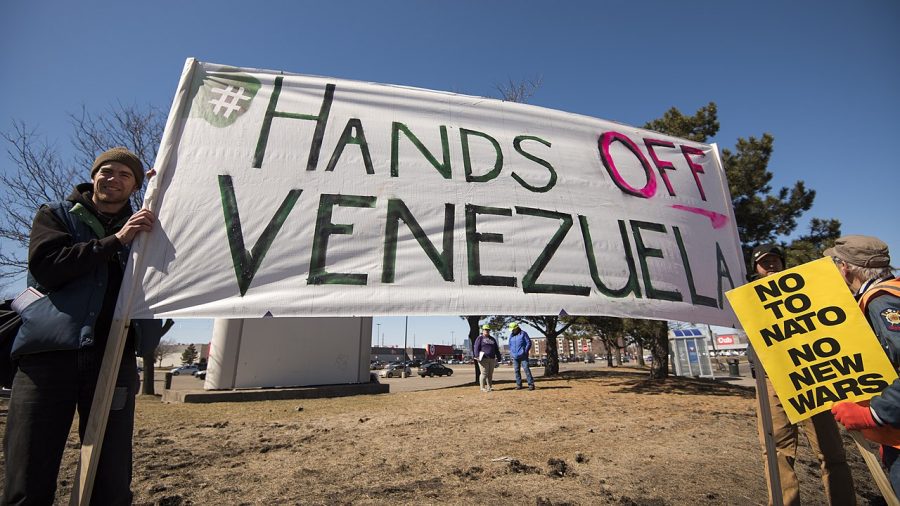US Foreign Policy toward Venezuela
A Legacy of Intervention
US foreign policy has always been fraught with controversy, particularly in South America. As inflation continues to rise and refugees flee from Venezuela, a nation wrecked by poverty and corruption, it’s crucial to understand America’s role in the chaos.
US-Venezuela relations go all the way back to the 1920’s, when Nelson Rockefeller discovered massive oil reserves in South America and started drilling. Under his leadership, the Creole Oil Company became the world’s biggest petroleum producer in spite of local opposition. Rockefeller profited off of Venezuelan oil until 1976, when president Carlos Andres Perez nationalized the industry. This process is designed to prevent the exploitation of resources by private and/or transnational companies and to redirect an industry’s profits for government use. But in this case, Perez elected industry leaders who were heavily invested in private oil companies, so profits still went to American corporations until twenty-two years later. At that point, socialist Hugo Chavez changed the leadership system, diverted profits to his administration, and began creating massive social welfare programs. While these choices were initially popular, Nicolas Maduro, Chavez’s successor and the current president, expanded social projects to a dangerous degree. He also ousted democratically-elected government officials in favor of his own personal appointees. Falling oil prices, reckless spending, and corruption came to a head in 2014, when Venezuela’s economy collapsed.
As inflation continued to skyrocket in 2017, President Trump declared that America must hold Maduro accountable for his mismanagement and instituted trade sanctions that stunted 99% of the Venezuelan economy. Trump and other US officials hoped that this maximum-pressure policy would provoke the Venezuelan military to overthrow Maduro out of desperation (which they show no signs of doing). The US paints blocking trade as a necessary step to crack down on an authoritarian regime, and President Biden is poised to continue many Trump-era policies in Venezuela. But as sanctions fail and Venezuelans suffer, we must examine America’s more sinister motives.
By implementing economic restrictions, the government can block profits from benefitting Venezuela, even if those profits are made using Venezuelan resources. American companies can then gain more economic control. The Rockefeller industry evolved into companies like Citgo, a US petroleum corporation controlled by Venezuela since the Chavez administration. When the economic crash hit, its profits were essential for sustaining welfare programs. But in 2019, a surge of Trump-led sanctions kicked Venezuela while it was down. New restrictions severed oil companies from the government, virtually undoing nationalization and leaving Maduro scrambling for sources of capital. The US, the UK, and Portugal then diverted Venezuela’s oil profits, around $6 billion, into frozen accounts.
While Venezuela suffered, the US profited. John Bolton confirmed in an interview with Fox News that America has strong financial incentives for the sanctions. The former national security advisor and fierce conservative said that “it’ll make a big difference to the United States economically if we could have American oil companies… produce the oil capabilities in Venezuela.” He went on to say that these sanctions would also “be good for the people of Venezuela,” a difficult sentiment to accept when those oil resources used to make up half of the nation’s budget. Many believe the US is also looking to weaken leadership in hopes of eventual military intervention, a theory that’s supported by the influx of troops around the region and a $15 million dollar bounty that America placed on Maduro’s head.
While the incentives for US sanctions are questionable, their effects certainly aren’t. Alina Douhan, a United Nations specialist, reports that restrictions have devastated human rights: “Impediments to food imports, constituting more than 50 per cent of food consumption, have resulted in the steady growth of malnourishment in the past 6 years.” Young kids are dropping out of school in droves to support their families. A lack of the imported diesel fuel used to power machinery means that agriculture stands still. But despite these atrocities, it doesn’t seem as if the US will lift major sanctions anytime soon.
Clearly, this isn’t a cut-and-dry decision. Venezuelan politics have been complicated for decades. Many people deny the legitimacy of Maduro’s 2018 reelection, while socialist supporters respond by citing heavy US interference. Debates rage about whether Venezuela’s unwillingness to accept western aid stems from long-standing corruption, disregard for its people, or fear of a capitalist overthrow. China, Russia, and Cuba jockey for influence in the region, forming alliances that will have serious consequences for foreign policy and global perceptions of leftism. America has to take all of these factors into account when deciding on the best path forward. But ultimately, Maduro’s belly remains full regardless of sanctions, something that can’t be said for hundreds of thousands of civilians. We must reckon with that human cost. Because if the US continues to ignore innocent lives in favor of political power, are we really any better than Maduro?








ovitt • May 12, 2021 at 3:37 pm
A sophisticated analysis; blockades of poor countries to punish leadership we don’t care for is a long-standing and morally reprehensible US foreign policy staple. Our longtime blockades of Cuba and Iraq, for example, are responsible for an unconscionable amount of human (children mostly) suffering. You final paragraph is spot on. Keep up the good work. (El Salvador’s woes?)